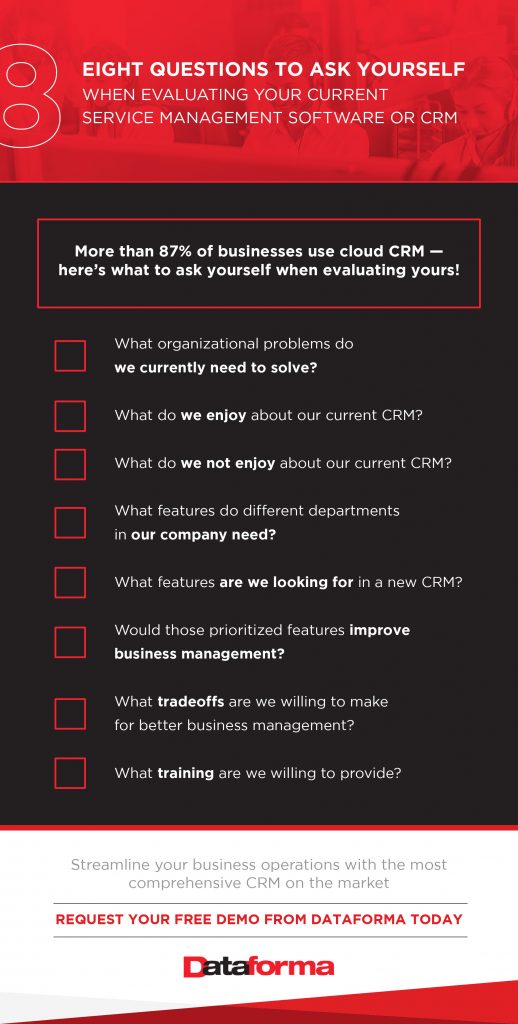
If you’re in the commercial roofing industry, you know your company’s roofing software is often just as essential as the physical work you do to put quality roofs over buildings. Cloud-delivered business management solutions function behind the scenes to streamline your work and make it more efficient. More than 87% of businesses now use cloud CRM — compare that figure to the one from 2008, when only 12% did.
If you need to photograph a potential job site, send info to the sales team, coordinate the materials required for the work and confirm a bid within hours, customer relationship management (CRM) software can help you do that. If you need to make an appointment, update your technician’s calendar in real time, document the work in a centralized location and use the information to create paperless invoices, the software can help you do that too.
At some point, you’ll likely need to consider taking stock of your current software and figuring out whether you need a new contractor CRM. When you do, you’ll need to know what to look for in a contractor CRM, and you’ll need to ask the right questions to determine which software can meet your needs reliably. When that happens, this contractor CRM software guide can help you figure out where to start.
Why Do You Need A Contractor CRM?
Why does your company need roofing manager software in the first place, and how does it affect your business? Let’s take a look at how and why service management software has revolutionized the contractor industry.
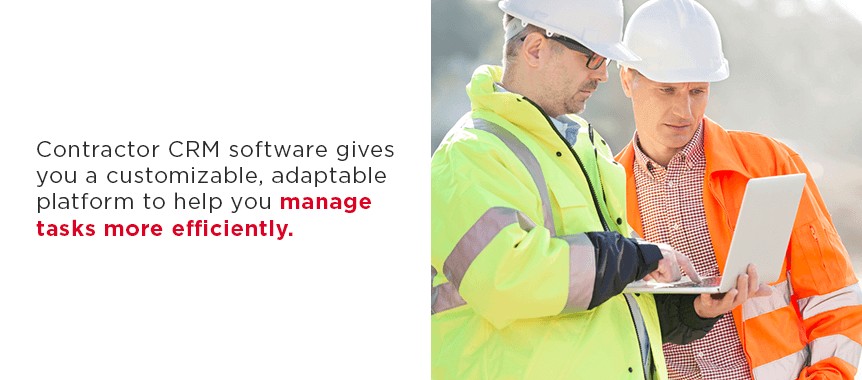
Business management is time-consuming and complicated. You have dozens of tasks to do each day, and you have to take on multiple roles, from handling initial sales calls and scheduling appointments to ordering materials and creating and processing invoices. Contractor CRM software gives you a customizable, adaptable platform to help you manage tasks more efficiently — and a good CRM can provide sophisticated industry-specific functionality beyond the basics.
Below are a few of the benefits a flexible, high-quality contractor CRM can provide for your business:
Integration of Separate Systems
Good CRM software helps you combine separate systems into a centralized program. If you already use CRM in your business, you likely already have systems in place for billing, appointment scheduling, documentation and report generation. A designated roofing manager CRM combines all those features into a single centralized platform, helping you manage work from the initial call to the final invoice payment. You’ll save time and gain a more comprehensive perspective on your client relations by having everything in one place.
Specificity
If you currently use CRM software for your business, it may have many generalized features — it has to generalize to be applicable over a broad range of target industries. Many industries need to manage customer data, track activities and project statuses, compile reports and keep an eye on potential leads.
Contractor CRM tailored to one central industry — or even a few related industries like roofing, plumbing and electrical — allows for valuable specificity. In the roofing business, you need to order roofing materials like shingles, tar, gravel and nails and track those orders in your system. You also need to manage production teams, use existing measurements to generate reliable estimates, and track and evaluate technician and sales performance. A good contracting CRM enables you to digitize industry-specific aspects of your business to streamline processes and make customers happier faster.
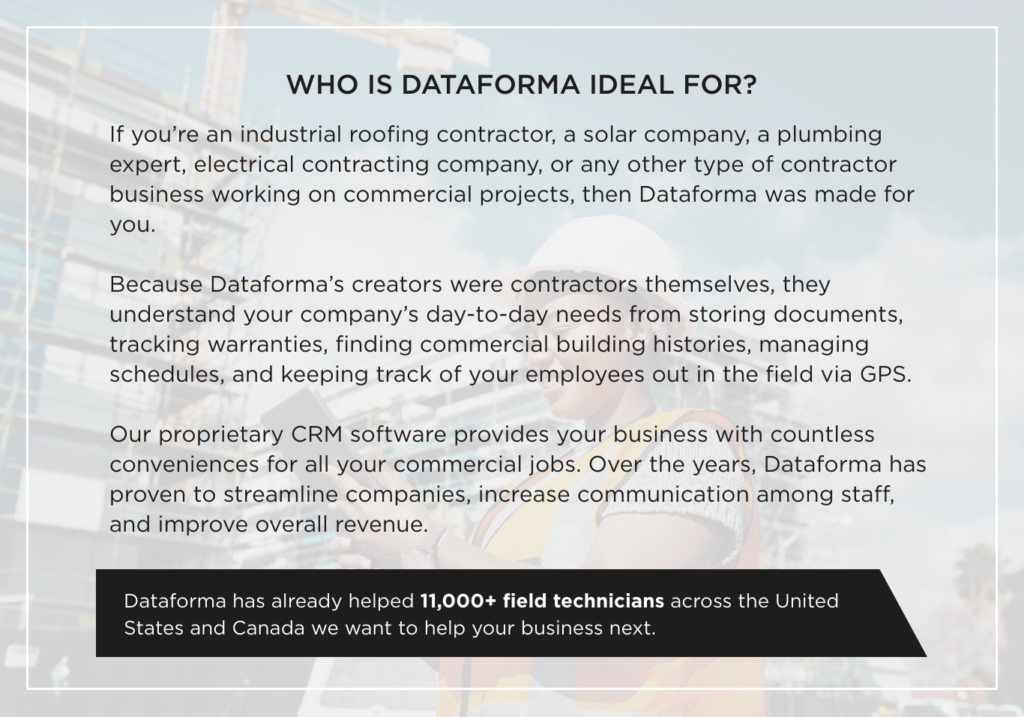
Organization and Efficiency
A standard CRM provides organization and efficiency, of course. By digitizing and coordinating many aspects of your business, it saves you time by keeping better track of your operations and speeding up processes that are quick to accomplish with a software platform but tedious to perform by hand.
An industry-specific contractor CRM extends and focuses those benefits. It allows you to consolidate, integrate and streamline your processes — a calendar that updates in real time makes your business more organized, and an app that can easily categorize and call up different documentation media makes you more efficient.
Scalability
A general CRM is useful for many basic tasks, but at some point, your business will outgrow it as it becomes more complex. Because a basic CRM focuses on functions that apply to many industries, it may not be able to keep up as your company branches out, becomes more specialized and requires more specific functionality.
Contractor CRM software, on the other hand, is much more likely to scale gracefully with your business and handle ever-shifting volumes of data. Because its design is specific to the unique requirements of your industry, it will continue adding capability and value as your business expands.
Customization
If you’ve been using a general CRM for your company, you’ve probably run into situations where the built-in features offered limited customization. You may have been able to tailor some aspects of the software but found it not adaptable enough.
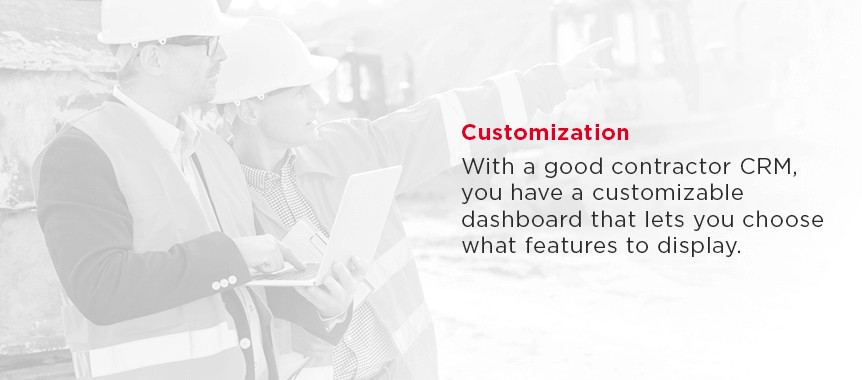
Contractor CRM helps alleviate this restriction. With a good contractor CRM, you have a customizable dashboard that lets you choose what features to display. You’ll have access to advanced features like GPS tracking, work order calendars, bid and lead management and other capabilities that you can tailor to your needs.
Why Is It Important to Evaluate Your Software Solution Needs?
Why is it so essential to perform a thorough assessment of what you’re looking for in a software solution? A quality contractor CRM is a sizeable investment, so once you have it, you’ll want to get the best use out of it you possibly can. You don’t want to spend a few months familiarizing yourself with its features only to realize it won’t entirely meet your needs and wish you’d picked a different platform instead.
Developing Priorities
Before you start shopping around for CRMs, give yourself a head start by listing your organization’s priorities. Make one list of the features you absolutely need in your software. This could be a numbered list with your number-one priority at the top and the rest ranked in order of their importance.
Separately, make a list of the features that would be nice but aren’t vital to have in your new software. Feel free to dream big in this section — more knowledge is better, and having a defined list of appealing features gives you a complete picture of your goals. As you embark on your search, keep your must-have list at the forefront of your considerations and reserve your nice-to-have list for bonus features.
Addressing Specific, Troublesome Problems
When you’re looking for the right contractor CRM, it can be tempting to focus on the flashy selling points of each system you see. However, your search will go more smoothly if you can identify the key issues you need your CRM to resolve and focus your search on software that can address those issues. Identifying thorny problems a CRM system could address helps you target your search and makes your software much more useful over the long term.

Knowing What Questions to Ask
Evaluating your software solution needs helps you figure out what questions to ask as you talk with representatives and observe demos. If you have a concrete idea of your weaknesses and goals already, you can formulate perceptive questions that give you the information you need. If your main questions are broad inquiries about what the software can do, you may not get a nuanced picture of the differences between various CRMs.
Finding Software With a Range of Appeal
When you make your list of need-to-have priorities and wishes, be sure to solicit opinions from throughout your company. If you receive a list of desired capabilities from your CEO, that list may differ dramatically from a list that a balanced selection of technicians, account managers and office staff would put together. Seeking input from a range of voices in your organization helps you find CRM software that will help everyone and boost your company’s capabilities overall.

Making a Fact-Based Decision
Too often, the person tasked with selecting a company’s new CRM may observe a few demos, ask a few questions and ultimately make the decision because of a slick sales pitch, flashy feature or sleek interface. For the best results, though, you’ll need to choose based on the concrete needs of your company and the software’s demonstrated abilities to help you meet them. Advance planning makes this decision-making much more straightforward — it removes the subjective, in-the-moment element and allows you to address your firm requirements.
Eight Questions to Ask When Evaluating Your Current Software or CRM
When you’re evaluating your existing CRM, ask specific questions to help generate a clear picture of your current capabilities and limitations. Ask yourself what you like and dislike most about your existing software and what additional benefits you’d like to see. Here are a few specific questions to help you get started in delving into your company’s current challenges, best software features and areas for improvement:
1. What Current Organizational Problems Do We Need to Solve?
Taking a hard look at your organization’s current challenges is one of the best ways to get started. Ask yourself what business challenges currently hinder your team and how software upgrades might help you address them more effectively.
For instance, your roofing team might report that it takes too long for after a client schedules an appointment for your contractors to receive notification of that appointment — a particularly trying difficulty if you pride yourself on quick turnaround times. Or your business might experience challenges with keeping its documents organized and accessible for immediate use when needed. Identifying these current problems helps you get started on looking for unique software solutions to address them.
2. What Features of Our Current CRM Do We Enjoy?
Along with asking yourself what aspects of your business aren’t working as well as they could be, it’s equally important to ask yourself what’s working well and what you’d like to keep. Maybe you particularly enjoy the way your current roofer software allows you to be eco-friendly by capturing client signatures through its app. Or maybe you appreciate its intuitive design. Whatever qualities you value, make a note of them and try to keep or expand on them.
3. What Features of Our Current CRM Do We Not Enjoy?
You’ll also want to ask yourself the opposite question — what features of your CRM seem outdated, cumbersome or unhelpful? If there are features you always dread using or try to work around, address those deficiencies if you change to a new contractor CRM. If your scheduling interface is too convoluted, or if you don’t have enough storage space to store the bulk of your photos and documents digitally, make a note of those shortcomings. Doing so will help you make an informed assessment of whether and how to upgrade your CRM software.
4. What Features Do Various Parts of Our Organization Need?
As we’ve discussed briefly above, it’s vital to seek input from various departments in your company to gain a balanced view of what features of a new software system might be most useful.
Your field techs might advocate for GPS positioning to help them find locations more quickly and do their work more efficiently. Your sales department, on the other hand, might see little need for GPS functionality. Instead, it might advocate for sales software features for a sales team CRM that can track leads and provide reports on sales opportunities. Gathering data about the tools desired in different parts of your company helps you gain a solid overall picture of your ideal system.
5. What Features Would Be Nice to Have in a Potential New CRM?
Once you’ve gathered a variety of balanced feedback, you can start to think about which features would be ideal to have in a potential new software system overall. When you account for a diversity of opinions, the consensus may be that you’d like a better, more centralized way to maintain files on building work history. Or you may determine that having a work order calendar that syncs directly with an app is an absolute necessity for convenience, while the ability to transition to a paperless sales department would be nice but isn’t essential.
Even if you don’t end up implementing all the suggestions you end up with, putting together a master wish list is an excellent step on the road to making an informed decision.
6. Do Those “Nice to Have” Features Outweigh or Solve Most of Our Existing Problems?
When you’ve assembled your list of prioritized features, take a minute to fact-check how well those capabilities would genuinely improve business management. If you had a built-in state-of-the-art estimate builder, for instance, would it help solve your sales team’s issues with writing profitable estimates, or would other knowledge-based difficulties remain?
Ask yourself whether your wish list would realistically address the obstacles you face or whether it would merely add some additional style and flair. If you’ve come up with features you’d enjoy having and they would also help you address challenges head-on — or if the benefits you’d gain would dramatically outweigh the continuing challenges — an upgrade might be the right choice.
7. What Tradeoffs Are We Willing to Make?
You can take your list of priorities one step further by being straightforward about what tradeoffs are practical for your business. Whether that’s meeting priorities within stringent budget constraints or keeping an older but reliable system because you’re not ready to accept the downtime necessary to implement a new one, be honest about the sacrifices your business would and would not be willing to make.
8. What Level of Training Could We Commit To?
When you implement a new CRM, you’ll likely need to provide training for your staff to get everyone on the same page. Ask yourself whether your team can feasibly put in the time and effort required to learn a complex new system or whether you’d want to look for highly intuitive, easy-to-learn software. It’s also possible you’d be able to get more out of your existing system with additional training, so it may be worth looking into that option as well.
How to Decide
Once you’ve probed your areas of weakness, assessed your current software, gathered ideas for exciting new features and determined your priorities for CRM, how should you decide whether to stick with your tried-and-true system or invest in an upgrade? And how should you approach choosing the right contractor CRM? Below are a few primary factors to consider:
Onboarding and Training
If it would take months to get your new system set up and familiarize your team with its processes, the benefits may not be worth the trouble. Be sure to ask about onboarding time for the CRMs you’re interested in to determine whether the changeover would add substantial downtime and diminish your roofing company’s productivity.
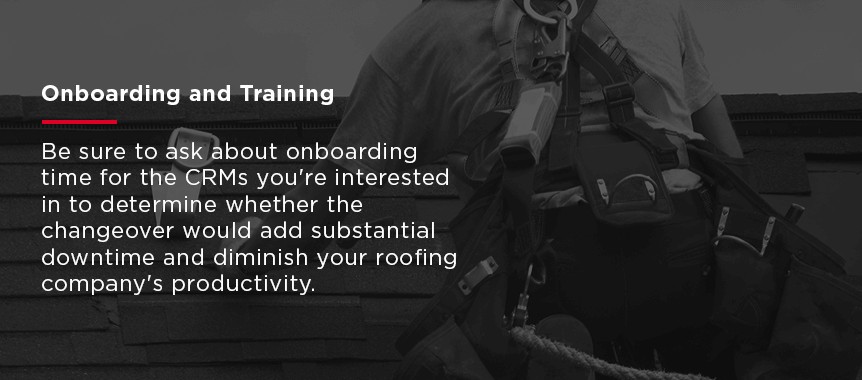
Similarly, some complex CRM systems require more extensive training than others. Some businesses may handle complex roofing projects that necessitate advanced software features — they may prefer a substantial upgrade even at the cost of extended training time. For other companies, the convenience of using CRM software immediately would outweigh the benefits of advanced features. Make sure you’ve determined which benefits are a higher priority for your business so you can choose CRM that provides the most value.
Cost
When you’re trying to figure out how to choose a CRM for roofing, keep your budgetary limits in mind. If a product is rich with features but implementing it would tear through your budget, you may want to look for more practical solutions. Fortunately, the variety of CRMs on the market means you should be able to find software that meets your needs at a price point that helps you remain profitable.
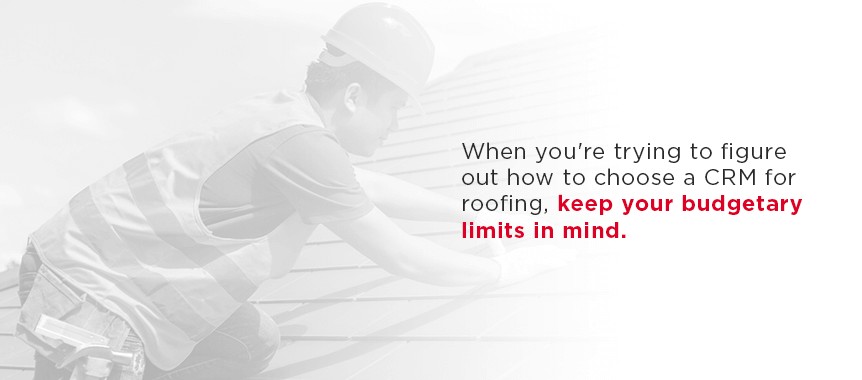
Sales Demos
The availability of free sales demos gives you a wealth of useful information for decision-making. It’s one thing to read about software features and benefits online or in sales brochures, but exploring their functionality in real time gives you a better idea of how the systems would work in your offices and on the job.
Testimonials and Videos
The best roofing CRM companies have partner testimonials, which are often valuable tools for helping you make your decision. If you read an abundance of credible, glowing reviews, you can feel reasonably satisfied that the software quality is high.
Additionally, more detailed testimonials or video tours can give you confirmation that the way you intend to use your new software is feasible. If you want to use your CRM to set up a complex system of bid tracking and management that allows multiple-department access, you may be able to find testimonials about the software’s facility with those tasks. Or the company may make videos available to illustrate those features. The information you gain can inform your decision-making process.
Contact Dataforma for a Free 15-Minute Software Demo
To learn more about streamlining your business operations and management, get in touch with Dataforma. Dataforma provides the most comprehensive CRM on the market, and we are continually improving to help our contracting clients consolidate their construction and long-term maintenance projects to manage their business operations more efficiently and productively.
Request your free 15-minute demo today, or take a look at our partner testimonials and video tours to learn more.


